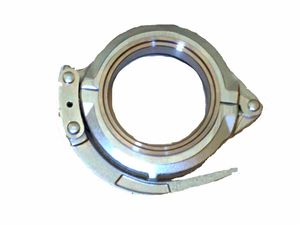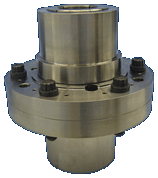Difference between revisions of "Clamp Couplings"
(Created page with "Category:Piping{{Knoppen}} <noinclude><!------------------------------------------------ * READ THIS FIRST * Only edit this page if you can improve the content. * Improper u...") |
|||
| (One intermediate revision by one other user not shown) | |||
| Line 1: | Line 1: | ||
[[Category:Piping]]{{Knoppen}} | [[Category:Piping]]{{Knoppen}} | ||
[[File:Clamp Couplings.jpg|thumb|right|Clamp Couplings]] | |||
[[File:Clamp Couplings1.gif|thumb|right|Clamp Couplings]] | |||
'''Clamp coupling''' is a coupling method that can be used when joining two piping units or [[Hoses]]. It is one of the most popular methods and is also the most simple in design. The clamp coupler is typically used to join two hoses at their end, or to join a hose end securely to the end of a pipe, though these particular coupling devices come in many variations of form and function depending on what they are used for. | |||
Consisting in most cases of a circular metal strap that has measured holes in it that are fit to the threads of a screw, a clamp coupler is easily tightened with a screw or nut driver. This means clamp coupling can be a secure way to connect any two items of any material. A clamp coupling device is by far the most commonly utilized type of coupling unit when a rubber or polyurethane hose has a metal component attached to one end. Such devices are also used for a spacer that connects two hoses together. | |||
Clamp couplings come in many different shapes, sizes, and options. Some are rubber grommets that have screwed tension-clamping rings around them used for compression. Others are hinged plastic cylinders with threaded holes that line up on each side so a screw can be used to tighten the cylinder around the joined materials. | |||
A clamp coupling is different from the sleeve coupling in that the sleeve used in this type is split from one side.The shafts are entered and keyed to this sleeve and then split sides are screwed together.These are capable of handling an enormous amount of thrust load which is perfect for vertical pumps which have significant weight along with the thrust created by pumping. | |||
Latest revision as of 07:57, 12 March 2014
Clamp coupling is a coupling method that can be used when joining two piping units or Hoses. It is one of the most popular methods and is also the most simple in design. The clamp coupler is typically used to join two hoses at their end, or to join a hose end securely to the end of a pipe, though these particular coupling devices come in many variations of form and function depending on what they are used for.
Consisting in most cases of a circular metal strap that has measured holes in it that are fit to the threads of a screw, a clamp coupler is easily tightened with a screw or nut driver. This means clamp coupling can be a secure way to connect any two items of any material. A clamp coupling device is by far the most commonly utilized type of coupling unit when a rubber or polyurethane hose has a metal component attached to one end. Such devices are also used for a spacer that connects two hoses together.
Clamp couplings come in many different shapes, sizes, and options. Some are rubber grommets that have screwed tension-clamping rings around them used for compression. Others are hinged plastic cylinders with threaded holes that line up on each side so a screw can be used to tighten the cylinder around the joined materials.
A clamp coupling is different from the sleeve coupling in that the sleeve used in this type is split from one side.The shafts are entered and keyed to this sleeve and then split sides are screwed together.These are capable of handling an enormous amount of thrust load which is perfect for vertical pumps which have significant weight along with the thrust created by pumping.

